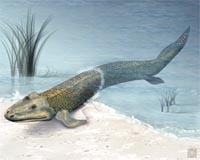| . |  |
. |
Vancouver, British Columbia (UPI) Jan 10, 2009 Canadian researchers say the pine beetle has killed so many trees, the forests of British Columbia now put more greenhouse gases into the air than they store. The experts say that has been true since 2003, The Toronto Globe and Mail reported Saturday. By last year, dead lodgepole pines had a bigger carbon footprint than the province's human population. By February 2008, when the province's premier Gordon Campbell praised the forests as a sink for greenhouse gases, that was no longer true. "We have few natural allies in our fight against climate change that are more important than our forests," the Campbell government said in a policy speech. The problem is that the carbon plants take in during their lives returns to the atmosphere when they decompose. The pine beetle has killed an estimated 1 billion trees, most of them expected to decay over the next half-century or so. The pine beetle is native to North America, and many trees have natural defenses. But the most recent infestation in western Canada and the United States has been far more severe than previous ones, with experts blaming global warming.
Share This Article With Planet Earth
Related Links Darwin Today At TerraDaily.com
 Oldest tetrapod tracks found in Poland
Oldest tetrapod tracks found in PolandKielce, Poland (UPI) Jan 6, 2009 The world's oldest tetrapod prints have been discovered in the Holy Cross Mountains of southeastern Poland, paleontologists said. The prints of the tetrapods -- four-legged animals -- are 18 million years older than previously confirmed findings of tetrapod tracks, said Per Ahlberg, a paleontologist at Uppsala University, Sweden. Ahlberg and his colleagues found fossilized prints ... read more |
|
| The content herein, unless otherwise known to be public domain, are Copyright 1995-2009 - SpaceDaily. AFP and UPI Wire Stories are copyright Agence France-Presse and United Press International. ESA Portal Reports are copyright European Space Agency. All NASA sourced material is public domain. Additional copyrights may apply in whole or part to other bona fide parties. Advertising does not imply endorsement,agreement or approval of any opinions, statements or information provided by SpaceDaily on any Web page published or hosted by SpaceDaily. Privacy Statement |